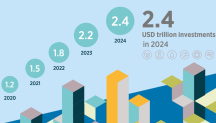

Pacific Islands Unite Around Enhanced Renewables Ambition Under Climate Goals
Newsletter
Pacific SIDS committed to strengthening energy transformation through more ambitious nationally determined contributions ahead of COP26
Abu Dhabi, United Arab Emirates, 28 February 2021 – In a year of critical action on climate mitigation and adaptation, Pacific Island governments have reinforced their commitment to energy transition action and strengthened sustainable energy goals within updated nationally determined contributions (NDCs) ahead of COP26 in Glasgow, the United Kingdom in November.
At a meeting of high-level policy and intergovernmental representatives jointly hosted by the International Renewable Energy Agency (IRENA), the Regional Pacific NDC Hub and the UK COP26 Presidency, ministers and government representatives reiterated the need for transformative pledges that significantly reorient the world’s energy transition pathway. Pacific nations aim to be at the forefront of global efforts.
During the discussion, H.E Charles Obichang, Minister of Infrastructure, Palau, reaffirmed his country’s commitment to a sustainable energy future: “Palau is developing a new roadmap that will ultimately result in a 100 per cent fossil fuel free energy system. The pursuit of energy security through renewable energy makes environmental, social and economic sense for us, helping to fight climate change while creating opportunities for new industries and new jobs. Renewables are an opportunity for us to thrive in a new era of fossil fuel free energy production.”
Currently, 13 of the 14 Pacific Small Island Developing States (SIDS) have quantified renewable energy targets in their NDCs, submitted under the first round of Paris Agreement climate pledges, equating to nearly 2GW of renewables capacity. All Pacific SIDS are engaged in a process of NDC enhancement ahead of COP26 under the coordination of the Regional NDC Pacific Hub and with support of various development partners. Fiji, Marshall Islands, Papua New Guinea and Tonga have already submitted enhanced contributions.
Angeline Heine, Director of Energy, Republic of the Marshall Islands, noted that in order to meet multiple national objectives, her country’s strategy is organised around three pillars: “As a front liner on climate change the Republic of the Marshall Islands is fully committed to meeting its NDC objective of 100 per cent renewable energy by 2050. Our goal is ambitious, but our electricity roadmap has identified three key priorities, which address the technology, human resources, and investment components of the plan. We believe this ensures our transition is owned and advanced by the Marshall Islands people.”
Countries are given the opportunity to submit enhanced NDCs by COP26 by revising and enhancing mitigation and adaptation targets, finance goals, and developing concrete action plans for the implementation, formulation, and communication of long-term emission reduction strategies in 2020.
Representing the UK government, H.E Ken O’Flaherty, COP26 Ambassador for Asia and the Pacific, spoke of the opportunity for Pacific leadership both during, and in the lead up to, the climate meeting later this year: “The consequences of a warming planet will be catastrophic, particularly for citizens of the Pacific. COP26 can be the moment when the world comes together to ramp up momentum towards a climate resilient, zero-carbon economy and Pacific leadership can deliver the changes we need to see in the world. Many Pacific states have already committed to net-zero targets in their revised NDCs, which serve as inspiration for other countries to raise ambition.”
Francesco La Camera, Director General, IRENA, highlighted the global role Pacific Islands play in decarbonisation: “Pacific SIDS have become remarkable hubs of innovation on climate strategies, and a source of inspiration for the rest of the world. Even as they are severely impacted by deadly natural disasters, they continue to lead on climate action with steadfast resolve. While many Pacific nations set ambitious targets in their first NDCs, there is no doubt regional leadership shown in enhanced NDCs can inspire global efforts to drive meaningful action this year.”
Christian Gorg, Project Manager, Regional Pacific NDC Hub, said as the focus moves from ambition to implementation of the Paris Agreement goals, countries will need well-structured programmes to drive renewables development: “Energy is a common mitigation strategy among regional countries, and while their carbon emissions are insignificant their commitments are bold. The energy transformation can only be realised if countries understand their policy context, recognise any potential legislative barriers to development and are aware of the financing options available.”
A total of USD 5.2 billion of investment is needed by 2030 to implement what is currently targeted under the region’s NDCs, according to IRENA data based on the first round of NDCs. IRENA is working closely with several countries across the Pacific to enhance the renewable energy component of new NDCs for submission ahead of COP26.




